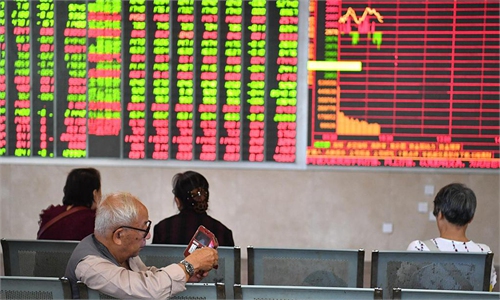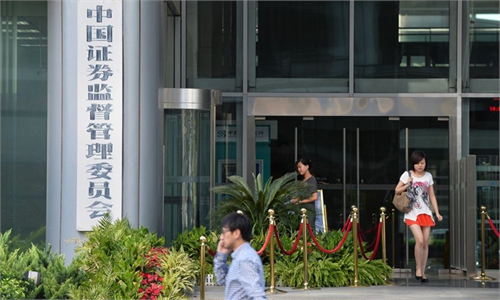
A concept photo of stock market of Hong Kong Illustration: VCG
Stocks in Hong Kong and the Chinese mainland markets plunged on Monday amid increasing uncertainties stemming from regulatory rules, geopolitics and fresh COVID-19 flare-ups that have prompted multiple cities and regions in China to upgrade their prevention measures.
It is, however, unnecessary to be pessimistic for the investors, especially for US-listed Chinese firms, which were badly affected last week following the US announcement of a provisional waitlist of five Chinese companies that may be removed from the US exchanges, as their fundamentals have remained strong, said analysts and researchers at investment banks.
Hong Kong's benchmark Hang Seng Index was down 4.97 percent at Monday's closing, the largest one-day drop since May 2020, as it was weighed on by the Hang Seng Tech Index.
That index tracks the 30 largest technology companies listed in the city, and it plunged 11.03 percent to close at 3,778.6 points, extending a slump from the previous session on worries of the shares being delisted at the US market.
More than 10 stocks including new-energy vehicle producer XPeng Motor, search engine provider Baidu and e-commerce giant JD.com slipped by more than 10 percent during Monday's trading.
In mainland markets, the benchmark Shanghai Composite Index finished 2.61 percent lower, while the smaller Shenzhen index was down by 3.08 percent.
The US Securities and Exchange Commission (SEC) announced a provisional list, singling out five Chinese companies that would have to submit evidence disputing their identification under the Holding Foreign Companies Accountable Act by March 29.
The threat prompted plunges among Chinese firms in the US stock market on Thursday, with some experiencing a 90 percent cumulative slump from their highest points.
"The slump has more to do with some foreign shorting and deliberate suppression, instead of corporate fundamentals," Yang Delong, chief economist at Shenzhen-based First Seafront Fund Management Co, told the Global Times on Monday, adding that the US market has become more degraded into a political tool for the Biden administration to suppress Chinese companies.
China's securities regulator voiced opposition against politicizing securities regulation in the wake of the US' crackdown. "We respect overseas regulators' efforts to strengthen supervision of accounting firms to improve the quality of the financial information of listed companies, but we firmly oppose the wrong practice of some forces politicizing securities regulation," the China Securities Regulatory Commission said on Friday.
The performance of those Chinese-funded firms extended to the Hong Kong market, which tumbled on Monday, showing that the market has concerns that if Chinese firms are forced to delist, their homecoming to the Hong Kong market will put pressure on the market's liquidity and valuation levels, according to Yang.
In spite of the concerns, the current Hong Kong stock market has bottomed out in terms of valuations. Most research institutions said that although the Hong Kong stock market has suffered great turbulence in the short term, it still has a bright outlook in the long run, and it is positioned as a preferred destination for the mainland companies to seek home listings.
Investment bank China Securities said that the fundamentals of Chinese firms have not changed for the worse, so there is room for a rebound in the short term, and it is necessary to track changes in the international situation, including further communication and progress between Chinese and US regulatory bodies.


